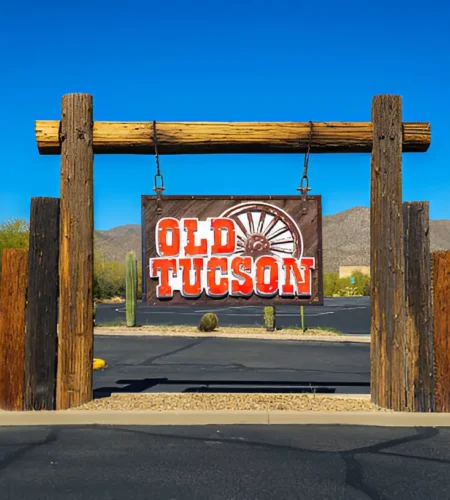Tucson’s intense desert climate and sprawling urban layout present unique challenges for trailer owners. Whether you own a camper, RV, or boat trailer, storing it properly is essential to protect it from sun damage, theft, and long-term wear.
This guide walks you through everything you need to consider—from climate and security to pricing and storage types—so you can confidently choose a trailer storage solution that fits your needs.
Key Takeaways
- Outdoor heat and UV exposure in Tucson can seriously damage trailers.
- Covered or climate-controlled storage significantly increases vehicle longevity.
- Security features like gated access and surveillance are essential.
- Choose a storage type that matches your trailer’s size, usage, and value.
- Planning ahead—both financially and logistically—ensures peace of mind.
Why Tucson’s Climate Demands Better Storage Solutions
Tucson’s desert environment isn’t just hot, it’s extreme. Daytime temperatures often soar above 100°F, with intense sun exposure and sporadic monsoon activity. Without protection, trailers can suffer:
- UV-related damage to seals, tires, and paint
- Warped interiors and cracked plastic fittings
- Moisture intrusion during monsoon season
Solution: Consider storage options with built-in protection like covered parking or indoor units. For higher-value or temperature-sensitive trailers, climate-controlled facilities offer added peace of mind.
Understanding the Types of Trailer Storage Available
Outdoor Storage
The most budget-friendly choice. These are open-air lots, typically fenced and gated. Suitable for short-term or weather-resistant trailers, but offers minimal environmental protection.
Pros:
- Affordable
- Easy access
Cons:
- Full sun and weather exposure
- Limited protection from theft or pests
Covered Storage
Ideal for reducing UV and rain exposure. These structures use metal or fabric roofs to provide partial shielding, helping prevent surface damage and material degradation.
Pros:
- Shields from sun and hail
- More secure than open lots
Cons:
- More expensive than outdoor options
- Limited climate control
Indoor & Climate-Controlled Storage
Enclosed storage with temperature regulation offers the highest level of protection. Ideal for luxury trailers, vintage campers, or boats with sensitive equipment.
Pros:
- Maximum protection from heat, dust, and pests
- Best for long-term or seasonal storage
Cons:
- Higher monthly costs
- Limited availability in high-demand areas
How to Evaluate a Trailer Storage Facility in Tucson
Security Features That Matter
A reliable storage facility should include:
- 24/7 Video Monitoring: Cameras with night vision deter theft and record suspicious activity.
- Gated Access: Controlled entry via keypad or keycard limits unauthorized access.
- On-Site Management: Personnel who can respond quickly to issues or emergencies.
- Perimeter Protection: Fencing, lighting, and well-maintained grounds that prevent intrusion.
Accessibility and Hours
If you plan to access your trailer frequently, check for:
- Extended or 24/7 gate access
- Drive-up units or wide lanes for large trailers
- Mobile app or online access for gate control and billing
Size and Layout Options
Make sure the facility can accommodate your specific trailer type. Measure your vehicle (including hitches and awnings) before reserving a unit.
Comparing Costs: What You Can Expect to Pay in Tucson
The pricing for trailer storage in Tucson varies by location, unit type, and amenities offered. Here’s a general guide:
| Storage Type | Typical Monthly Rate | Protection Level |
| Outdoor Lot | $50 – $100 | Basic (no cover) |
| Covered Parking | $100 – $200 | Moderate (UV + rain) |
| Indoor Climate-Control | $200 – $500+ | Full weather + temp control |
Tip: Some facilities offer discounts for long-term contracts or off-season rentals. Be sure to ask.
Prepping Your Trailer for Storage in Tucson
Before placing your trailer into storage, take these preventative steps:
- Clean Thoroughly: Wash exterior and clear out any perishable items inside.
- Inspect Tires and Fluids: Check air pressure, disconnect batteries, and seal tanks.
- Use a Protective Cover: Especially for outdoor or covered storage.
- Pest-Proofing: Seal all openings and avoid leaving food or moisture sources inside.
Taking the time to prepare your trailer reduces wear and extends its life even in storage.
Final Thoughts: Making the Right Choice for Long-Term Value
Trailer storage in Tucson isn’t just about convenience—it’s about protection. Choosing the right storage solution helps preserve your vehicle’s condition, value, and readiness when it’s time to hit the road again.
When evaluating options:
- Think about how often you’ll access your trailer.
- Match the storage type to the value and sensitivity of your trailer.
- Never compromise on security or access reliability.
Whether you’re storing a compact camper or a high-end travel trailer, the right facility gives you peace of mind and keeps your trailer road-ready for your next adventure.
Frequently Asked Questions
What’s the best type of trailer storage for Tucson’s climate?
Covered or indoor storage is best for long-term protection from UV rays, heat, and sudden storms.
Is outdoor trailer storage safe in Tucson?
It can be—if the lot is fenced, gated, and monitored. But outdoor lots expose trailers to the elements, which may cause damage over time.
How much should I expect to pay monthly?
Outdoor lots start around $50/month. Indoor climate-controlled units can go up to $500/month depending on size and location.
Can I access my trailer anytime?
Many facilities offer 24/7 access via secure gate systems, but some may have limited hours. Always check before booking.
What should I do before putting my trailer into storage?
Clean it thoroughly, disconnect the battery, check tires and fluids, and consider using a breathable cover.


Comments